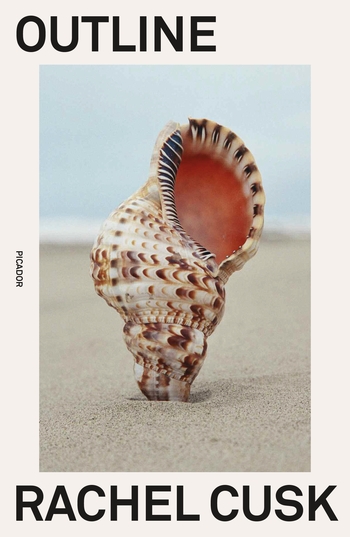The narrator of Taffy Brodesser-Akner’s Fleishman is in Trouble (2019) first reveals herself, briefly, thirteen pages into the novel. Our protagonist Toby Fleishman—newly-divorced in New York City, encroaching on middle age, fielding an onslaught of dating app messages— discovers that without his ex-wife Rachel he no longer has “a natural first person to tell” the monumental and mundane details of his life. When Toby receives news at work, then, “he thought about calling me or Seth” instead, says our narrator—who turns out to be Libby Epstein, a friend of Toby’s from a semester abroad in college. The dip into first person catches the reader off guard: That “me” —weighty and metallic—hooks into the framework of the novel, anchoring Toby’s story to a specific, subjective presence.
Brodesser-Akner’s Libby exists within a tradition of effaced first-person observer-narrators: Nellie of Willa Cather’s My Mortal Enemy (1926), the collective chorus of Jeffery Eugenides’ The Virgin Suicides (1993), and— perhaps most famously— Nick Carraway of F. Scott Fitzgerald’s The Great Gatsby (1925), to name a few. More specifically, though, she exists within a tradition of writer-narrators who are described as documenting the stories they report, rather than merely speaking out into the ether. Sarah Orne Jewett’s Country of the Pointed Firs (1896) features such a narrator, as does James Alan McPherson’s wonderfully complex titular story from his 1977 collection Elbow Room. These narrators are working: Jewett’s Bostonian narrator relocates to coastal Maine to write sketches of the town’s residents; McPherson’s narrator endeavors to report a story about an interracial couple in the wake of Loving v. Virginia. In having specific writing projects, these narrators slyly assert their productive power. They spin other characters’ narratives, refashioning them until the stories inhabit new mediums. The texts become textiles. Look what I made, these narrators whisper to the reader from behind the page. Look how craftily I tied these threads together.
Libby, we learn, formerly worked at a men’s magazine before acquiescing to stay-at-home motherhood. She stands to the side for most of the novel’s beginning, allowing us to become wholly immersed in Toby’s crisis. Gradually though, her own project becomes clear. She describes a famous story written by the men’s magazine’s “in-house legend” Archer Sylvan, one that she regarded as seminal in her journalist days. The story, titled Decoupling, details the dissolution of a marriage, and we come to understand Fleishman is in Trouble as a reimagining of this fictional text. Libby describes the challenge Archer has posed for her, one that haunts her writerly ambitions:
When I became a professional writer, I tried to write like Archer: that way he had of releasing the valve of his anger slowly, tensely, beautifully so that his vortex of empathy, when sent through the prism of the anger, created a generalized disgust for the state of the world that seemed like the only conclusion a smart, thinking person could come to.
Libby laments her failure to filter her own empathy through such a prism of anger. “I never landed on anger—” she explains,
I never ended a story there—and I think maybe that was where I failed. My empathy only created more empathy, which sounds good, yes, but was born of inherent cowardice. I was too scared to finish with anger. I was too scared to be wholly disgusted with my subjects… I was afraid to stay angry, to leave it all hanging out there with no resolution. I was afraid of seeming too hateful… only I knew it was actually a failure of bravery and will to be as compassionate as I was.
Compassion, when saturated to such a degree, can have the effect of both absolving and obscuring a novel’s narrator. Like Libby, the writer-narrator of Rachel Cusk’s Outline trilogy (unnamed until the novel’s final pages) tends toward obsessive empathy. In the trilogy’s first book, Outline (2014), the narrator sits on a plane bound for Athens, where she is to teach a writing course. She lingers over the flight attendants’ warning about securing one’s own oxygen mask before helping others: “No one protested, or spoke up to disagree with this commandment that one should take care of others only after taking care of oneself,” she observes. “Yet I wasn’t sure it was altogether true.” The metaphor goes on to govern the remainder of the novel: The narrator privileges her colleagues’ stories over her own, her patience and earnest interest luring their confessions to the surface. Meanwhile, she safeguards the story of her own marital collapse, rarely offering up details unprovoked.

Through their narrators, Brodesser-Akner and Cusk explore a type of empathy that is perhaps—historically, over-simplistically, binarily—specific to women. It’s an empathy that borders on martyrdom. Should a mother really leave a child or husband gasping for air as she fiddles with her own mask? It’s a test, isn’t it? The worlds of these novels, their authors seem to argue, expect these women to self-sacrifice in the end, to place the masks—doubling as megaphones—around others first. The men cannot be left to suffocate; the things they have left to say are too important. Fleishman’s Libby narrates a scene where Toby’s ex-wife tells him a story of her experience of workplace harassment, and Toby bristles—not at the injustice Rachel has suffered, but at “how not a part of this story he was.” He itches to reclaim his role as protagonist, and for the majority of the novel, Libby lets him. The vortex of empathy exerts its indomitable force.
I go on a date with a conventionally-attractive soil ecologist. The fact that being hot doesn’t gain him anything in his line of work—the fact that he spends his time out in fields alone, his head inclined down toward the earth as though in prayer, the poetry of it all—renders him all the hotter. I imagine he’s aware of his looks, how they chip against stereotype. I imagine it is this knowledge that lends him a sort of stunning confidence. He smooths his facial hair as he tells me about Iowa. He tells me about his lapsed Catholicism. He tells me about his ex-girlfriend in Mexico. He left his bicycle at her place, near where he conducts his fieldwork, and now he cannot reclaim it without risking a confrontation. I listen closely and am not annoyed by any of it. (I’m shocked by how I’m not annoyed by any of it.) He is generous, I decide, holding a magnifying glass up to himself. He invites me to consider him closely, as I would a specimen, and I oblige.
The man Cusk’s narrator sits next to on her transnational flight is generous in this same way. He tells her about his first wife; he tells her about his second wife. She listens with an near-pathological degree of attention, and she’s caught off guard when, after much pontificating, he turns the conversation over to her. He asks what work she has brought with her to Athens. “I felt the conscious effort in his enquiry,” the narrator explains, “as though he had trained himself in the recovery of objects that were falling from his grasp.”
How freeing, though: to be an object falling from the grasp of a man.
How freeing, to be an object falling from the grasp of a man.
The ecologist describes to me the microorganisms present in Mexican topsoil. He explains their massive implications for our greater ecosystem. His work is meaningful, and I am—blessedly—off the hook. I need not flail around for reasons as to why what I do, why my writing, is important. Through his sermonizing, I come to believe that the story of topsoil is the story of all of us. I want to hold a megaphone up to him, to give his words more oxygen. We’re onto our second round of drinks before he flinches in recognition. He’s realized how little he’s asked me and is just the slightest bit ashamed. He tries to recover me as I fall from his grasp. “I’m sorry,” he says, “I’ve been blabbering. What is your relationship to soil?”
Later in Outline, when the narrator’s seatmate invites her to spend the afternoon on his boat, she leaves him to swim out into the ocean alone. Freed from the threat of enquiry, she articulates the feeling of leaving the rocky shores of her past—the ruins of self-narration—behind:
I felt that I could swim for miles, out into the ocean: a desire for freedom, an impulse to move, tugged at me as though it were a thread fastened to my chest. It was an impulse I knew well, and I had learned that it was not the summons from a larger world I used to believe it to be. It was simply a desire to escape what I had. The thread led nowhere, except into ever-expanding wastes of anonymity.
I, too, have felt that there is something soothing and thrilling in anonymity, in one-sided observation, in hoarding the stories of others. It’s this instinct that has led me to seek solace behind the scrim of fiction-writing. When I took a nonfiction workshop to fulfill my MFA program’s “out-of-genre” requirement, I found myself stunned by the courage of my peers. I don’t think I’ll ever be able to manage it, I thought to myself. This confessionalism. So allergic was I to the idea of writing about my own experiences, I wound up taking various interviews I’d conducted and collaging them into a theatrical script. Perhaps the project was a “failure of bravery,” to borrow Libby’s words, or perhaps it was something more dignified. I’m still not sure. I’m still anxious over what would happen if I were to write about myself. If I were to remain an object held within grasp, orbiting, recursive, every facet reflecting the same dumb parts of myself I’ve come to know too well. How to reorient myself around some foreign axis? I wonder. How to tilt myself so that I resemble something new?
Over the course of Fleishman is in Trouble, Libby struggles to regard her own ambitions as anything worth documenting. “God, what a fucking idiot I was,” she says. “My dreams were so small. My desires were so basic and showed such a lack of imagination… I had been so creative in every other aspect of my life; how I’d turned out so conventional and so very establishment was bewildering.” It’s this paradox that antagonizes the effaced narrator: Is it enough to be a sharp mind and keen eye if every other part of you remains unremarkable? “The women wear these yoga pants instead of regular pants and they yell at their children,” Libby tells her friends, describing moms at Disney World. “And then you realize you’re wearing yoga pants.” Can a narrator justifiably take up space in a story if she’s no less vapid than the subjects she skewers?
I’m still anxious over what would happen if I were to write about myself. If I were to remain an object held within grasp.
Libby’s solution to her basicness is to do away completely with the reductive shell of her body—the athleisure-clad body that resembles every other woman’s athleisure-clad body—and to “[impose her] narrative onto [the narratives of men], like in one of those biology textbooks where you can place the musculature picture over the bone picture of the human body.”
“Trojan horse yourself into a man,” she suggests, mutating the analogy slightly, “and people will give a shit about you.”
In the last third of the novel, Libby indeed ends up Trojan-horsing not only her story, but also Rachel Fleishman’s into Toby’s narrative. It is important, though, that Libby doesn’t manage to build and utilize Archer Sylvan’s prism of anger; this narrative move is not a mean trick. No tunic-clad soldiers burst out from a wooden abdomen to attack Toby Fleishman. Libby’s choice to cede the last portion of the novel to Toby’s ex-wife Rachel isn’t an act of spite. It is important to acknowledge that Libby and Toby remain friends, that her final act— caring enough about Toby to prophesize his ending— is in fact an act born of compassion.
It is important to know that I enjoy the company of the soil ecologist. That though we don’t end up together, we do go out again. What is my relationship to soil? I say something about neglecting to wash my carrots well. How I’ve heard it’s good for the microbiome. He nods in approval. It does not matter that this is the closest we might come to understanding one another, to finding common ground. In our own private ways, we’ve both made something meaningful of the encounter—he in the moment, recounting the minutiae of his life to a willing listener, and me, after the fact, spinning the threads of his narration into something new. Something warm that fits me and that I can wear long into the winter.
“I would start to try again,” Libby promises herself at the novel’s end. “I would sit next to my children while they watched inane television shows and I would smell their heads and allow the hormones inherent to motherhood to wash through me.” In relinquishing her insecurities of sameness, Libby proves her own method of writerly empathy has paid off. She’s managed to let Toby remain a compelling protagonist, do justice to Rachel’s side of the story, and reveal that she herself isn’t as boring as she purports to be. “I would try to find peace with my regular life,” she vows. “Or maybe I would one day see that the regularness was actually quite extraordinary.”
The post The Women Who Write Themselves Out of the Story appeared first on Electric Literature.








